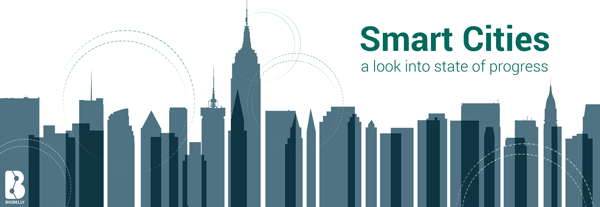
There is a groundswell building around the Internet of Things (IoT) and Smart City initiatives. Some of the solutions are Jetson-like in their application to city operations, management and planning – sci-fi technology sending data from various city and residental applications to individuals’ smartphones, self-operating transportation, smart six-foot-tall touchscreens to navigate subways, public space Wi-Fi, and connected public parking.
The Internet of Things is not some far-fetch, future reality that has yet to be realized. Success will come as cities turn to technology innovations that help them streamline operations, better forecast needs, and solve issues like pollution, congestion, accessibility, increasing waste, and sustainability.
Ater the RE/WORK IoT Summit in Boston, we debriefed the team on the latest and greatest conversations among the movers and shakers of Smart Cities & IoT iniatitives. We’ve captured the most compelling questions below to share with you.
Q – After speaking with many Smart City and IoT influencers, including those who work in city government, what is the number one issue keeping them up at night?
A – There’s no single issue city governments face. Instead it’s a strategic focus on several areas of interest – from economic development to water, energy to waste management, health and human services to transportation, payments to telecommunications, as well as public safety and security. We consistently hear that city planners and administrators want to integrate more practical approaches in urban management in addition to strategic planning that leverages environmentally friendly and sustainable solutions.
What’s really exciting is the role technology plays and the innovations available that make turning today’s cities and towns into smarter communities that respond quickly to residents, visitors, local workers and businesses.
Q – Can you give some examples of Smart City initiatives?
A -There are thousands of projects and pilots underway in cities around the world. Each takes a different approach to addressing city operations and services. Some initiatives include smart street lights and bike routes that respond dynamically to traffic (pedestrian, vehicle, bicycle), smart water meters to support resource optimization, fleets of electric vehicles, free public outdoor Wi-Fi access, and parking systems that allow users to feed meters by cell phone.
Q – What will make these IoT-enabled solutions a reality?
A – Most cities have big ideas AND limited resources to make them reality. That is not stopping enterprise municipalities that are looking at creative ways to bring projects to fruition.
Successful Smart City projects will come from enabling technologies, new approaches, citizen engagement, and policy with leadership. Enabling technologies will make cities smart. The growth of technologies that promote cloud-based services and Internet of Things, the proliferation of smartphones, and the adoption of sensors and RFIDs networked together are presenting new ways to communicate and collaborate.
We believe the greatest promise comes from big data analytics, which is already proving it can make city functions “smart.” Combine analytics with connectivity and data management and you’ve created the linchpins that control everything from devices, instruments, and controls that monitor city operations all the way to business operations related to, say, finance and procurement.
These technologies have shown solid results helping cities create new services, make the most of their operational efficiency, and, like businesses, gain a competitive advantage over other cities.
Q – So you see data as the Holy Grail to Smart Cities?
A – Big data is not about sorting through massive amounts of information to find that one vital piece of information. It’s about identifying patterns and building new services and approaches around those information-based patterns to improve operational efficiencies and reduce expenses. The end result? Making city life more manageable and enjoyable.
Whether you call it a Smart City, digital city, intelligent city, knowledge-based city or any of the other terms used, cities of today that are innovating for tomorrow use digital communication and information technologies to enhance the quality and performance of urban services. They use innovative technologies or the application of technology in new ways to reduce costs and resource consumption in ways that increase citizen engagement.
Q – Looking into a crystal ball, what does the future hold for Smart Cities?
A – Municipalities around the globe will continue to deploy Smart City technology solutions that improve operations and allow for real-time response to challenges. They will extend the traditional transaction relationship they have with their citizens to one that is responsive. Smart solutions, which already appear in most government sectors, will gain further traction in city and town services, transportation, traffic management, energy, health care, water, and waste.
As the global community evolves, cities and towns will need to adapt to technological, economic, and environmental changes. They will continually look at devising strategies for smart urban growth that take into account things like climate change, pressures on public finances, and urbanization.



